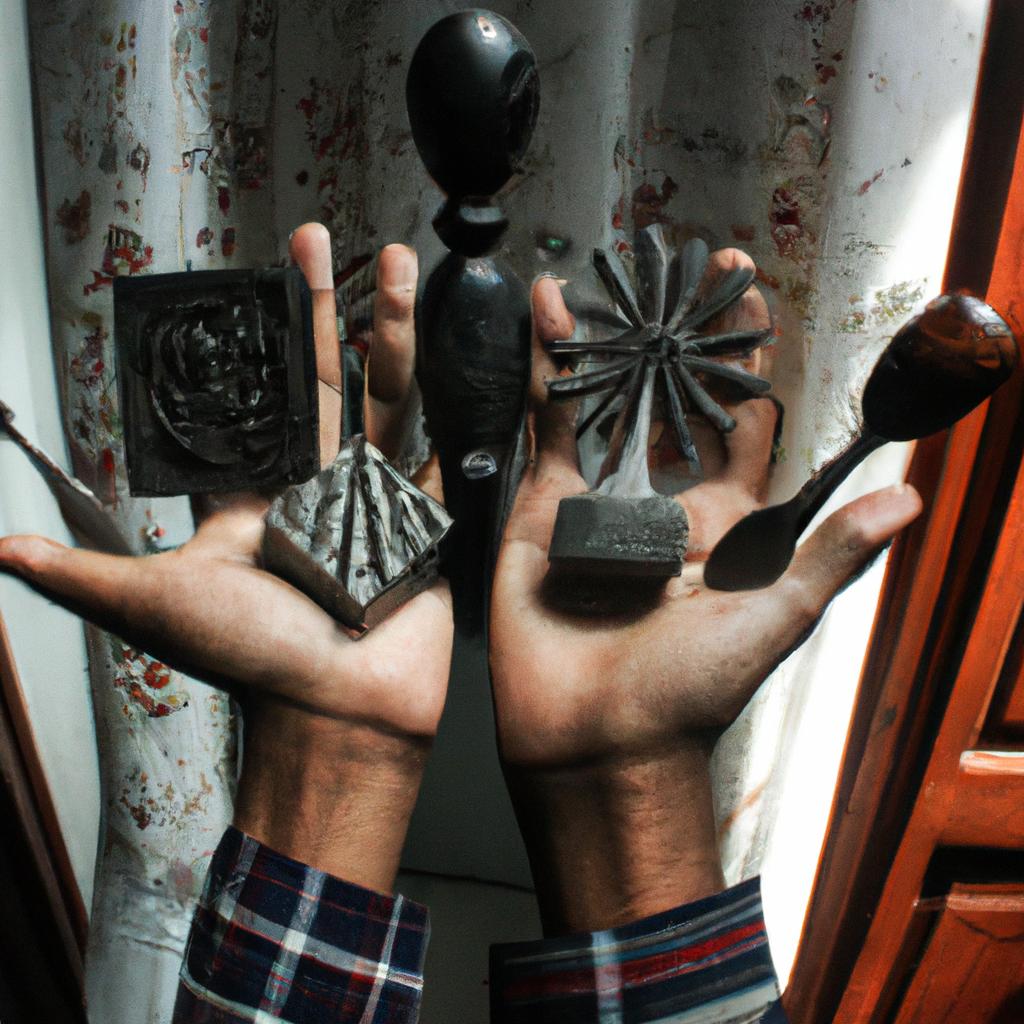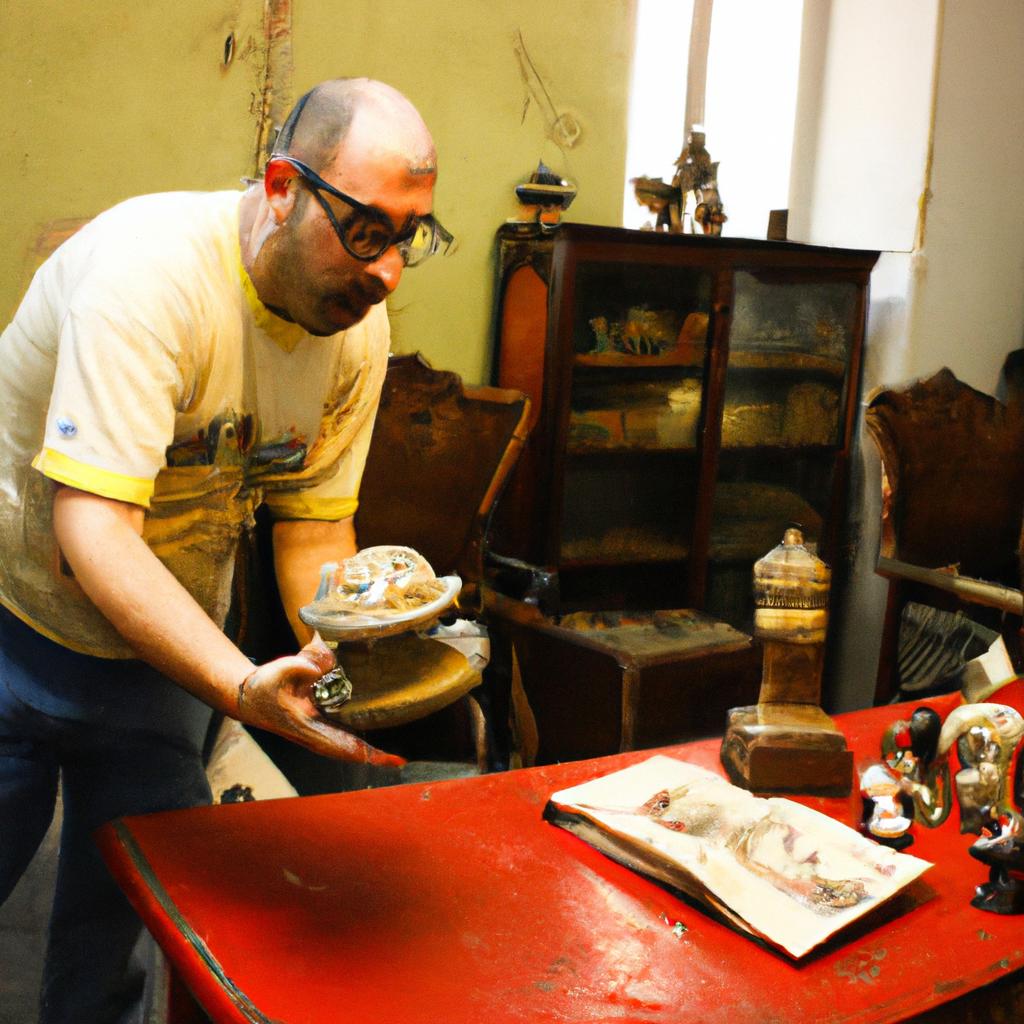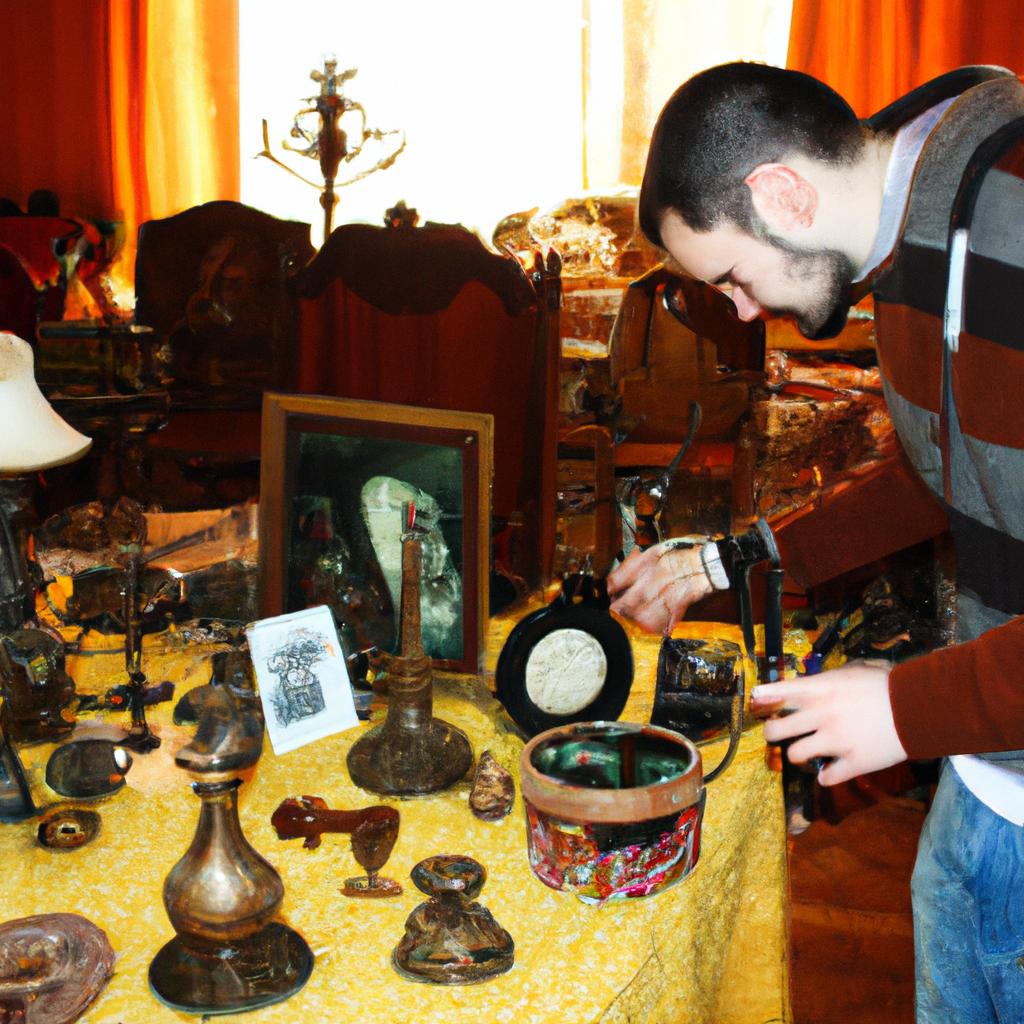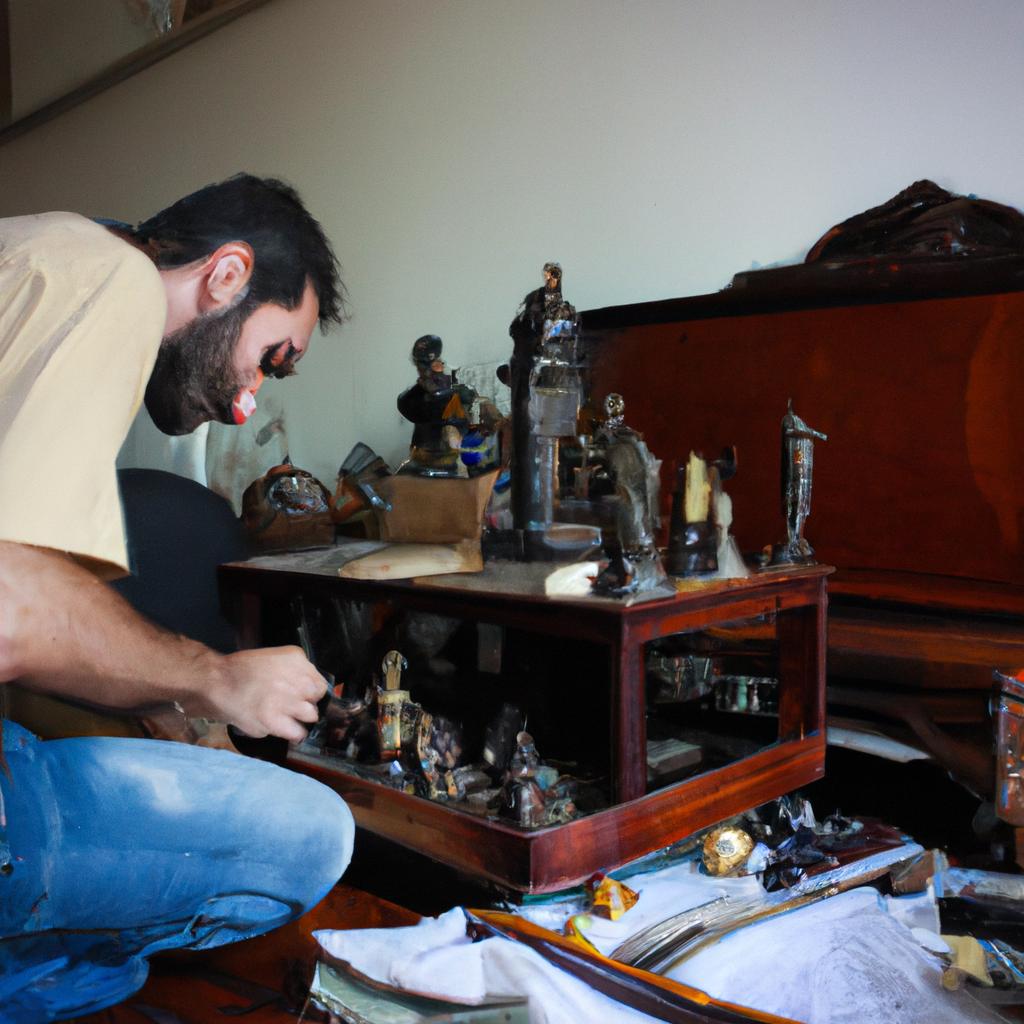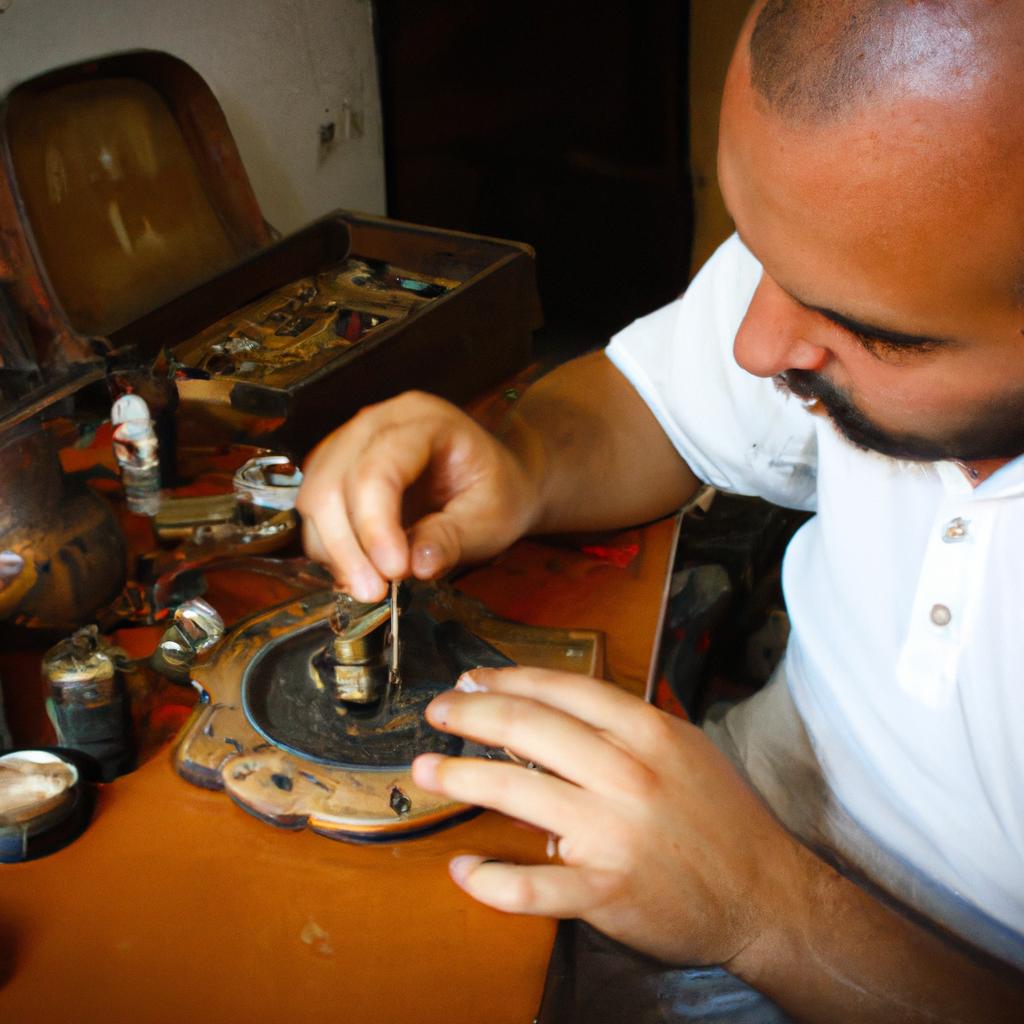Authentication Services: Ensuring Trust in Antiques and Collectibles
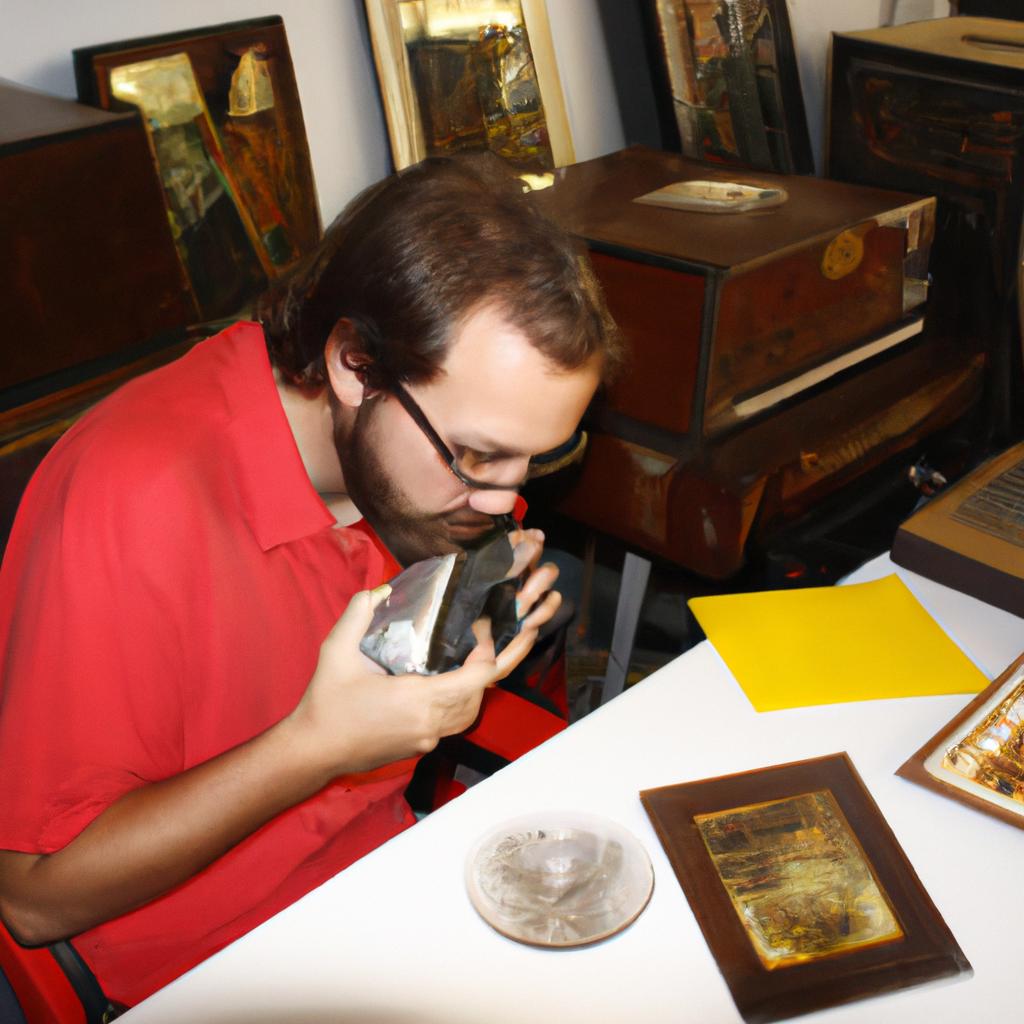
Authenticity is a crucial factor when it comes to antiques and collectibles. Buyers, sellers, and collectors alike seek assurance that the items they acquire are genuine and hold historical or artistic value. To address this need for trust in the market, authentication services play a pivotal role by providing expert opinions on the authenticity of these objects. For instance, consider a case where an antique dealer purchases what appears to be a rare 18th-century painting attributed to a renowned artist. Without proper authentication, doubts may linger regarding its provenance and potential value. In such situations, authentication services act as neutral parties equipped with specialized knowledge and techniques to evaluate the genuineness of artifacts.
The primary purpose of authentication services is to establish credibility through meticulous examination processes tailored specifically for antiques and collectibles. These organizations employ experts who possess extensive knowledge in various fields such as art history, archaeology, numismatics, or philately. By utilizing their expertise along with advanced technologies like spectroscopy analysis or carbon-14 dating, these professionals can determine whether an object is authentic or counterfeit. Moreover, authentication services often maintain comprehensive databases containing information about past forgeries or replicas commonly encountered in the market. This archival data allows them to compare newly examined items against known fraudulent items, further enhancing the accuracy of their assessments.
When a client submits an item for authentication, the process typically begins with a thorough visual examination. Experts scrutinize various aspects such as brushwork, materials used, style, and signature (if applicable) to assess its consistency with known works from the artist or time period in question. They may also study any accompanying documentation or provenance records to establish a chain of ownership.
In certain cases, additional scientific testing may be necessary. For example, infrared imaging can reveal underlying layers or alterations in paintings, while X-ray analysis can expose hidden structures or repairs. Additionally, techniques like spectroscopy can analyze pigments and determine their age or origin.
Authentication services operate independently and maintain strict confidentiality to ensure impartiality and prevent conflicts of interest. Once the examination is complete, they provide clients with detailed reports summarizing their findings along with an expert opinion on the authenticity of the object. These reports are valuable for buyers looking for assurance before making significant investments or for sellers seeking validation to command higher prices.
It’s important to note that while authentication services strive for accuracy, there is always a level of uncertainty involved in evaluating antiques and collectibles due to factors like incomplete historical records or sophisticated forgery techniques. Therefore, it’s crucial to rely on reputable and established authentication services recognized within the industry.
In conclusion, authentication services play a critical role in ensuring trust and confidence in the market for antiques and collectibles. By employing experts armed with specialized knowledge and advanced technologies, these organizations provide reliable assessments regarding an item’s authenticity. Their meticulous examination processes and comprehensive databases help safeguard against fraudulent objects, allowing collectors and buyers to make informed decisions based on credible information.
The Importance of Authentication Services
Authentication services play a crucial role in ensuring trust and reliability within the realm of antiques and collectibles. Without proper authentication, individuals may unknowingly purchase counterfeit or fraudulent items, leading to financial loss and disappointment. To illustrate this point, let us consider the case of an antique enthusiast who purchases what appears to be a rare artifact online, only to later discover that it is a cleverly crafted replica. Such experiences highlight the need for reliable authentication services in this field.
One key reason why authentication services are important is their ability to provide expert analysis and verification of the authenticity of antiques and collectibles. These professionals possess extensive knowledge and expertise in various areas such as historical periods, materials used, craftsmanship techniques, and distinguishing features specific to different types of artifacts. By utilizing advanced tools and methodologies, they can examine every aspect of an item to determine its age, origin, and legitimacy.
To further emphasize the significance of authentication services, consider the following emotional response evoking bullet points:
- Peace of mind: Knowing that your antiquities have been thoroughly authenticated by experts provides reassurance against potential fraud.
- Preservation of history: Authenticating valuable items helps preserve our cultural heritage by preventing counterfeits from entering markets.
- Investment protection: Proper authentication ensures that collectors’ investments retain their value over time.
- Avoiding legal issues: Purchasing authentic items prevents unintentional involvement with illegal trade practices associated with fake goods.
Moreover, integrating a three-column table into this discussion allows us to visualize some common benefits offered by authentication services:
| Benefits | Explanation |
|---|---|
| Expert analysis | Trained specialists use their vast knowledge to scrutinize every detail |
| Verification | Thorough examination confirms origins, materials used, and other critical factors |
| Protection against fraud | Identification of counterfeits safeguards buyers from deceptive practices |
| Assurance of investment value | Proper authentication ensures that the worth of collectibles remains intact over time |
In conclusion, authentication services are essential in maintaining trust and confidence within the antiques and collectibles market. By providing expert analysis, verification, and protection against fraudulent activities, these services offer both collectors and buyers a sense of security when investing in valuable items. In the subsequent section about “Different Types of Authentication Methods,” we will explore various techniques employed by professionals to ensure the authenticity of artifacts.
Different Types of Authentication Methods
Transitioning from the previous section on the importance of authentication services, let us delve into the different types of authentication methods that are employed in ensuring trust in antiques and collectibles. To illustrate this point, consider a scenario where an individual has come across what appears to be a rare antique painting at a local flea market. Without any form of authentication, it can be challenging for both buyers and sellers to establish the authenticity and value of such items.
There are several key types of authentication methods used in assessing the genuineness of antiques and collectibles:
-
Expert Opinion: One common method involves seeking expert opinions from professionals with specialized knowledge in specific fields. These experts have years of experience studying and evaluating similar items, enabling them to provide valuable insights into their authenticity.
-
Physical Examination and Testing: Another approach is through physical examination and testing techniques such as X-rays, carbon dating, infrared analysis, or microscopic inspection. These scientific methods help identify unique characteristics or materials used during a particular period, aiding in determining if an item is genuine or not.
-
Provenance Research: Provenance research refers to tracing the history and ownership of an item back to its origin or creation. This involves extensive investigations into records, archives, catalogs, sales receipts, letters, photographs, or other documented evidence related to the object’s past.
-
Comparative Analysis: By comparing an item against known authentic examples or reference materials within the same category or time period, one can assess similarities or discrepancies that may indicate authenticity or forgery.
In order to better understand these different methods visually:
| Method | Description |
|---|---|
| Expert Opinion | Seek advice from specialists knowledgeable about specific categories |
| Physical Examination and Testing | Utilize scientific techniques like X-rays or microscopes |
| Provenance Research | Investigate historical documentation tracing an item’s origins |
| Comparative Analysis | Compare against authenticated examples for similarities |
Employing these authentication methods helps establish trust and confidence in the authenticity of antiques and collectibles, minimizing the risk of purchasing counterfeit or misrepresented items. By utilizing a combination of expert opinions, scientific testing, provenance research, and comparative analysis, collectors and buyers can make informed decisions regarding their purchases.
Transitioning into the subsequent section on the benefits of using authentication services, let us explore how these methods positively impact both buyers and sellers in the market for antiques and collectibles.
Benefits of Using Authentication Services
Consider a scenario where an individual comes across a rare antique at a local flea market. The item appears to be genuine and valuable, but how can one be certain? This is where authentication services play a crucial role. By providing expert verification and certification, these services ensure trust in antiques and collectibles. In this section, we will explore the importance of authentication services and their impact on establishing credibility.
Role of Authentication Services:
Authentication services offer several key benefits that contribute to building trust within the antiques and collectibles market. Firstly, they employ various methods for verifying the authenticity of items. These methods may include extensive research, visual examination by specialized experts, scientific testing techniques such as carbon dating or spectroscopy, and comparison against known databases or archives of similar objects.
Moreover, authentication services provide individuals with peace of mind when making significant purchases or investments. Knowing that an item has been thoroughly examined by professionals who possess deep knowledge and expertise in their respective fields instills confidence in buyers. It assures them that they are acquiring authentic pieces rather than falling victim to counterfeit replicas or misattributed artifacts.
Furthermore, authentication services often collaborate with reputable institutions such as museums or auction houses to establish standards and guidelines for evaluating antiques and collectibles. This collaboration ensures consistency in procedures and enhances the overall integrity of the field. By adhering to accepted practices, these services augment transparency and reduce fraudulent activities within the marketplace.
Emotional Impact:
To highlight the emotional significance of utilizing authentication services, consider the following bullet points:
- Avoidance of financial loss due to purchasing fake items.
- Preservation of cultural heritage through accurate identification.
- Protection from unethical sellers preying on unsuspecting buyers.
- Confidence in personal collections or display pieces knowing they are genuine.
Table: Emotional Response
| Emotion | Reason |
|---|---|
| Relief | Assurance of avoiding financial loss and making informed choices |
| Pride | Owning authentic pieces that contribute to personal collections |
| Trust | Confidence in the expertise of authentication services |
| Protection | Safeguarding against fraudulent sellers and misattributed items |
Understanding the pivotal role of authentication services in establishing trust, it is essential to consider key features when selecting a reliable provider.
Next Section: ‘Key Features to Look for in an Authentication Service’
Key Features to Look for in an Authentication Service
Imagine you are a passionate collector of antique coins. One day, you come across a rare coin that seems to be exactly what your collection has been missing. However, before making the purchase, doubts arise in your mind regarding its authenticity. This scenario highlights the crucial role that authentication services play in ensuring trust and confidence in the market for antiques and collectibles.
Ensuring Authenticity
Authentication services employ various methods to verify the authenticity of items, providing buyers with peace of mind. These methods may include:
- Expert examination: Experienced professionals carefully examine the item using their expertise and knowledge to identify any signs of forgery or alteration.
- Scientific analysis: Advanced techniques such as carbon dating, X-ray imaging, or spectroscopy can be employed to determine an object’s age, composition, or origin.
- Documentation review: Experts analyze historical records, provenance documents, and previous appraisals to establish a credible chain of ownership.
By utilizing these comprehensive approaches, authentication services help prevent fraud and protect collectors from purchasing counterfeit or misrepresented items.
Building Trust
The presence of reputable authentication services within the market fosters trust between buyers and sellers. When potential buyers know that an item has undergone rigorous scrutiny by experts, they feel more confident about its authenticity. In turn, this trust facilitates fair transactions and supports a healthy marketplace for antiques and collectibles.
To understand the significance of authentication services in building trust further, consider how they address common concerns among collectors:
| Concerns | How Authentication Services Address Them |
|---|---|
| Fear of buying fakes | Verification process ensures genuine items only |
| Uncertainty about value | Expert appraisal provides accurate valuation |
| Lack of information on provenance | Historical research establishes an item’s background |
| Doubt regarding condition | Thorough examination identifies any damage or restoration |
Through their robust procedures and transparent practices, authentication services empower both buyers and sellers, promoting a more reliable and trustworthy market.
Facilitating Education
Authentication services also play a crucial role in educating collectors about the intricacies of their chosen field. By providing detailed reports on an item’s authenticity, these services equip collectors with valuable knowledge that enhances their understanding of antiques and collectibles. This information can include insights into historical context, production techniques, or notable features specific to the item in question. As collectors acquire this knowledge over time, they become better equipped to make informed decisions and contribute to the preservation and appreciation of cultural heritage.
In conclusion, authentication services are essential for maintaining trust within the market for antiques and collectibles. Through rigorous verification processes, building trust between buyers and sellers, and facilitating educational opportunities, these services ensure authenticity while enhancing the overall value and enjoyment of collecting unique items.
Transition: Now let us delve deeper into how authentication services ensure trust in the market by examining their key features.
How Authentication Services Ensure Trust in the Market
Imagine you are a passionate collector of antique furniture, and you come across a beautifully crafted chair that is claimed to be from the 18th century. Intrigued by its historical significance, you decide to purchase it. However, how can you be certain that this piece is indeed an authentic artifact from the past? This is where authentication services play a crucial role in ensuring trust in the market for antiques and collectibles.
Authentication services offer comprehensive examinations and evaluations of items to determine their authenticity. By employing various techniques such as visual analysis, scientific testing, and provenance research, these services aim to provide an objective assessment of an item’s origins and legitimacy. For instance, let us consider a case study involving a rare painting attributed to a renowned artist. An authentication service would meticulously analyze factors like brush strokes, pigments used, canvas material, and compare them with known works of the artist to establish its authenticity.
To better understand how authentication services ensure trust in the market for antiques and collectibles, let us explore some key aspects:
-
Expertise: Authentication services employ highly qualified specialists who possess extensive knowledge in specific fields such as art history or numismatics (the study of coins). These experts have years of experience studying genuine artifacts and detecting fakes through careful examination.
-
Technology: Advancements in technology have significantly improved the authentication process. From high-resolution imaging systems that can reveal hidden details to non-destructive analytical tools capable of determining materials’ age and origin, modern technologies aid in accurate assessments.
-
Research Networks: Authentication services often maintain strong connections with academic institutions, museums, galleries, and other industry professionals worldwide. This network allows access to valuable resources like archives, catalogs, databases containing records of previously authenticated pieces – enabling thorough investigations into an item’s background.
-
Transparency: Trust is fostered through transparent processes employed by authentication services. They provide detailed reports of their findings, including the methods used, test results, and expert opinions. This transparency helps build confidence among collectors and buyers.
To illustrate the impact authentication services have on trust in the market, consider the following table:
| Authentication Service Benefits | Emotional Response |
|---|---|
| Assurance of authenticity | Peace of mind |
| Protection against fraud | Confidence |
| Enhancement of reputation | Satisfaction |
| Preservation of cultural heritage | Pride |
By offering these benefits to collectors and sellers alike, authentication services not only contribute to maintaining trust within the market but also help preserve our rich cultural heritage for future generations.
The importance of choosing the right authentication service for your needs cannot be overstated. In the upcoming section, we will explore essential factors to consider when selecting an authentication service that aligns with your requirements and safeguards your valuable items effectively.
Choosing the Right Authentication Service for Your Needs
Building upon the importance of authentication services in establishing trust within the market, it is essential to understand how these services can empower collectors and buyers alike. By examining their benefits and capabilities, we gain valuable insight into their role as guardians of authenticity.
To illustrate the impact that authentication services have on ensuring trust in antiques and collectibles, let’s consider a hypothetical case study involving a collector named Sarah. Sarah recently acquired what she believed to be an original painting by a renowned artist from an online auction platform. However, doubts about its authenticity began to surface once she started researching similar pieces. To alleviate her concerns, Sarah decided to seek assistance from an authentication service.
- Emotional bullet point list:
- Relief: The authentication process offers peace of mind to collectors like Sarah who may have doubts regarding the legitimacy of their acquisitions.
- Confidence: Knowing that experts are involved provides a sense of confidence, allowing buyers to make informed decisions when investing in high-value items.
- Protection against fraud: With rampant cases of counterfeit products flooding the antique market, engaging with an authentication service helps safeguard individuals from falling victim to fraudulent schemes.
- Preservation of cultural heritage: By ensuring that only genuine artifacts enter the marketplace, authentication services contribute to preserving our collective cultural heritage.
- Emotional table:
| Benefits of Authentication Services | Examples |
|---|---|
| Enhanced reputation | Increased trust among collectors and dealers |
| Value appreciation | Genuine items command higher prices due to confirmed authenticity |
| Facilitated insurance claims | Accurate documentation aids in processing insurance claims efficiently |
| Accessible expertise | Guidance provided by authentication services supports informed decisions |
In conclusion, authentication services play a vital role in establishing trust within the antiques and collectibles market. Through their expertise, collectors like Sarah can verify the authenticity of their acquisitions, ensuring confidence and peace of mind. These services not only protect buyers from fraud but also contribute to preserving our cultural heritage for future generations.
Please let me know if there is anything else I can assist you with!

